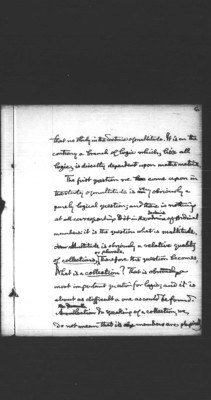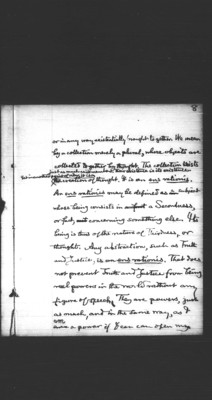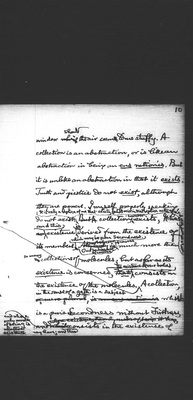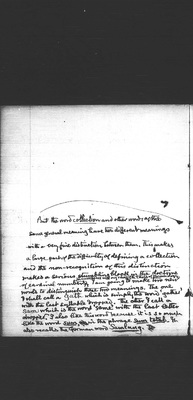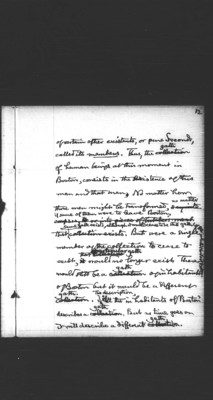Pages
21
6
that we study in the doctrine of multitude. It is on the contrary a branch of logic which, like all logic, is directly dependent upon mathematics.
The first question we come upon in the study of multitude is very obviously a purely logical question; and there is nothing at all corresponding to it in the doctrine of ordinal numbers: it is the question what is multitude. Multitude is obviously a relative quality of collections, or plurals. Therefore the question becomes, What is a collection? That is obviously a most important question for logic; and it is about as difficult a one as could be found. In speaking of a collection, we do not mean that its members are physically
22
8
or in any way existentially brought together. We mean by a collection merely a plural, whose objects are collected together by thought. The collection exists just as much as its members. Their existence is its existence. Yet in another point of view it is the creation of thought. It is an ens rationis. An ens rationis may be defined as a subject whose being consists in a fact a Secondness, or fact, concerning something else. Its being is thus of the nature of Thirdness, or thought. Any abstraction, such as Truth and Justice, is an ens rationis. That does not prevent truth and Justice from being real powers in the world without any figure of speech. They are powers, just as much, and in the same way, as I am a power if I can open my
23
10
window should the air seem to me stuffy. A collection is an abstraction, or is like an abstraction in being an ens rationis. But it is unlike an abstraction in that it exists. Truth and Justice do not exist, although they are powers. I myself, properly speaking, do not exist. It is only a replica of me that exists, and I exist in that replica as the effect of my being as a law. A collection, however, exists, and this existence is derived from the existence of its members which may be pure Secondness. Our bodies are of course much more than so many collections of molecules; but as far as its existence is concerned, the existence of our bodies consists in the existence of the molecules. A collection, in the sense of a gath is a subject which is a pure Secondness without Firstness, and whose only mode of being is whatever existence [it?] may have; and this consists in the existence of
24
But the word collection and other words of the same general meaning have two different meanings with a very fine distinction between them. This makes a large part of the difficulty of defining a collection and the non-recognition of this distinction makes a serious stumbling block in the doctrine of cardinal numbers. In accordance with my views of the Ethics of Terminology, I am going to make two new words to distinguish these two meanings. The one I shall call a gath which is simply the word ‘gather’ with the last syllable dropped. The other I call a sam which is the word ‘same’ with the last letter dropped. I also like this word because it is so much like the word sum, in the phrase sum total. It also recalls the German word Samlung.
25
12
of certain other existents, or pure Seconds, called its members. Thus, the gath of human beings at this moment in Boston, consists in the existence of this man and that man. No matter how those men might be transformed, no matter if some of them were to leave Boston, that same gath exists, although it would cease to be the gath of the inhabitants of Boston. But were a single member of the collection to cease to exist, that gath would no longer exist. There would still be a gath of inhabitants of Boston but it would be a different gath. The description, ‘All the inhabitants of Boston’ describes a gath. But as time goes on it will describe a different gath.
